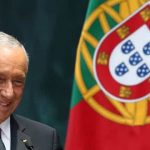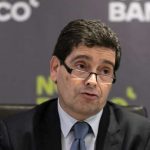Portugal’s financial ‘Voldemort’ quits Government
Portugal’s financial wizard Mário Centeno announced his decision to quit the PS socialist Government of António Costa this week.
The decision comes as the man heralded in polls as the third most popular Government figure in Portugal after its President, Marcelo Rebelo de Sousa and Prime Minister, António Costa, has resigned his post as Finance Minister and is widely tipped to take up the Governor’s job at the Bank of Portugal.
The current incumbent at the Bank of Portugal, Carlos Costa, who has been nicknamed ‘Mr. Magoo’ by the Portuguese press for turning a blind eye to reckless lending and bank mismanagement on his watch, leaves this month.
However, Mário Centeno declined in an interview with SIC Notícias to say whether he had been invited to take up the post as the new Governor of the Bank of Portugal. Meanwhile, he will remain as the President of Eurogroup until 12 July and his successor’s election has been scheduled for 9 July.
The outgoing Finance Minister also rebutted suggestions he has had a frosty relationship with the Prime Minister in recent times, or that he has had a difficult relationship with the President, Marcelo Rebelo de Sousa over a €850 cash transfer to Novo Banco, merely stating that he answered to the Prime Minister and not the institution of the President of the Republic.
Replacing Mário Centeno at the Finance Ministry is his right-hand man Ricardo Leão, a wizard himself in balancing the State’s books and a stickler for good financial housekeeping.
Leão, who has been secretary of state for the budget, represents ‘continuity’ said Prime Minister António Costa this week — a safe pair of hands who believes in “stability” and balancing accounts.
This is a “profound crisis” he said, which “we need to respond with policies capable of stabilisation and supporting employment, companies and families — so they can pay their bills,” he said.
Leão, 46, will be formally sworn in on June 15. In the meantime, Mário Centeno will be seen as a breath of fresh air at the Bank of Portugal which has overseen 10 years of crushing financial disasters with the collapse of several major banks.
In a tweet this week Mário Centeno also confirmed that he will be leaving his position as president of the Eurogroup of EU financial ministers next month.
After five years as finance minister, he left the State’s coffers with its first budget surplus since the Carnation Revolution of 1974 at the end of 2019 until the Covid-19 crisis has subsequently undone all the hard work as the Government has been forced this year to fork out hundreds of millions in State aid and loans to struggling companies and families faced with the effects of three months in lockdown.
In Mid-May, the Prime Minister said that he would maintain confidence in his Minister of Finance after a controversy over a payment from the treasury to Novo Banco before the bank’s contingent audit was published, and after Mário Centeno had told parliamentary MPs that the “Novo Banco Resolution Fund was the worst ever done in Europe”.
The injection of a €850 million payment for Novo Banco was made before the Prime Minister had allegedly even been informed of the State loan transfer which led to rebuttals from the finance minister who said that decisions of such gravity were “not informed via text message at the seaside from the beach shoreline”.
The row, which included the President of the Republic, Marcelo Rebelo de Sousa, gave rise to an internal crisis which ended after Prime Minister António Costa reiterated his full confidence in his finance minister. “The matter is duly closed and clarified, my confidence in the Minister of Finance has already been confirmed,” he said at the time.
This was followed by a further controversy over the Prime Minster’s decision to appoint an Portuguese oil executive as a sort of pro-bono ‘recovery Tsar’ to oversee the recovery plan for Portugal’s economy in its initial phase and which Portuguese media analysts suggested the finance minister was opposed to.
Asked about the nomination of António Costa Silva as economic advisor to the Prime Minister, Mário Centeno said, “I think the role of this contribution in the design of the next stabilisation steps has not been well understood.”
“I have never spoke to him (Costa Silva) in my life and I’m not too worried about that, I must confess,” he said in an interview with RTP’s Antena 1 on 5 June.










